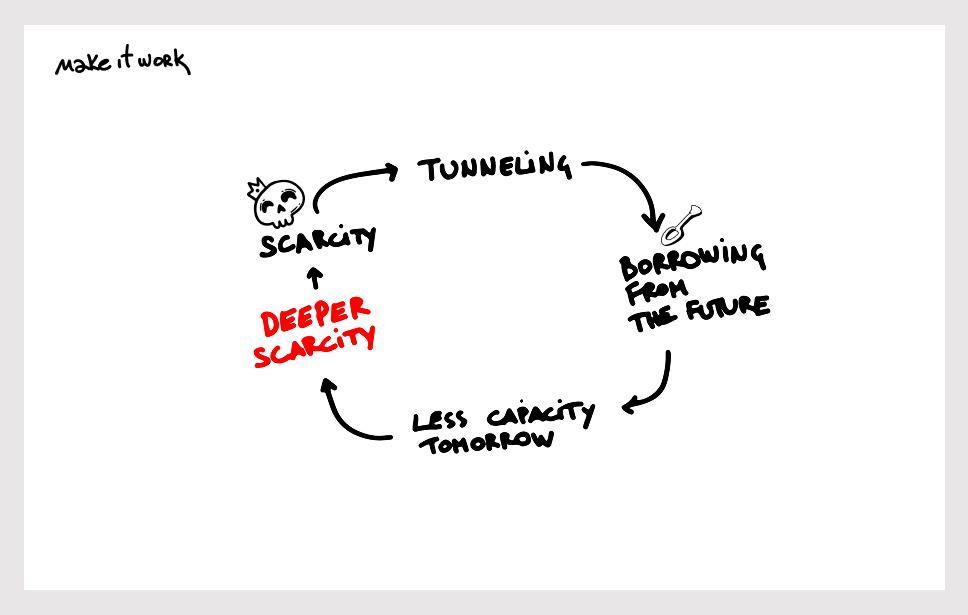Borrowing from the Future
- Danil

- Oct 6
- 4 min read
Updated: Oct 13
Why small teams keep running out of time, energy, and sanity

Ever wondered why it’s so hard to think about the future when you’re just trying to survive the week?
There’s actually research that explains this. It also reveals the true cost we pay when we can’t afford to think long-term, as everything feels urgent in the present moment.
The work is called Scarcity: Why Having Too Little Means So Much by Sendhil Mullainathan and Eldar Shafir — a behavioral economist and a cognitive psychologist who decided to study what happens to our thinking when we’re short on money, time, or capacity.
In short, they found this:
When we’re under pressure, we solve today’s problem by using up tomorrow’s resources.
They call it borrowing from the future.
(What a brilliant line! Love it!)
Examples
When there’s too little money
Individual:
Someone faces an urgent bill and takes a payday loan. Problem solved — for now. But next month, the hole is deeper, and the options are fewer.
Small team:
A nonprofit organization runs out of funds before the next grant is received. To stay afloat, they use personal credit cards or delay salaries. It buys them a week, but erodes trust, morale, and stability.
When there’s too little time
Individual:
You skip sleep or meals to meet a deadline. The work gets done — but at the cost of exhaustion. Can you do the same a few days later? Another round? And another?
That’s how short-term wins quietly turn into long-term losses.
Small team:
A team rushes a project, skips documentation, and forgets the debrief. They deliver on time (yay!), but next time they repeat the same mistakes, because no one remembers what worked.
When there’s too little cognitive space
In Scarcity, Shafir and Mullainathan use cognitive bandwidth as a metaphor for our limited mental capacity (the attention and mental energy available to think, plan, and make decisions).
When we live under scarcity of time, money, or stability, a big part of that bandwidth gets consumed by urgent worries and short-term problem-solving.
As a result, there’s less mental space left for long-term thinking or good decision-making, even if we’re perfectly capable of it.
Individual:
You accept a bad job offer or agree to everything. Just to get one stress off the list.
Small team:
Leads say yes to every “great opportunity” (partnerships, grants, events). Soon they’re stretched thin, always reacting, never building.
The Scarcity Loop
This is where it gets dangerous.
Each “borrowing” decision creates less capacity for tomorrow. Less capacity → more pressure → more short-term decisions.
Scarcity → tunneling (when your mind focuses only on what’s right in front of you) → borrowing from the future → even less capacity tomorrow → deeper scarcity.

Round and round. Until there’s nothing left to borrow.
That’s why people and small teams can’t just “plan better.” They’re already spending tomorrow’s energy to survive today.
What This Means for Small Teams
In small teams, nonprofits, or any resource-limited setting, this loop is everywhere:
Strategy and documentation get skipped in favor of urgency.
Recovery time is the first thing to go, so burnout becomes routine.
Leaders and managers overcommit, spending personal energy that never gets refilled.
How to Stop Borrowing from the Future
1. Leave Some Room
Even in crisis, protect a small pocket of slack: one unbooked day, one unallocated budget line. That’s your oxygen.
There’s a great rule I use when planning budgets: always set aside at least 15% for the unexpected. Always.
If things get tight, cut other lines, simplify production, find cheaper options, but don’t touch that 15% until the storm actually comes
That’s how you build flexibility right into the system.
2. Learn to say no, even to good things
Learn to say no to opportunities, ideas, and even to yourself (we all know the difference).
Sometimes very yes today is a no to something tomorrow.
Be clear about what you’re trading off: time, energy, trust, or focus.
3. Take Time to Reflect (Even Briefly)
One effective way to break the scarcity loop is to pause and reflect before moving on to the next thing.
A short retrospective (there’s always 30 minutes for the right kind of work, even when everything feels like it’s on fire) helps you see what drained you, what actually worked, and what can be done differently next time. It turns exhaustion into learning.
I wrote more about it (and made a small practical template) → How to Run a One-Person Project Retrospective
4. Don’t Blame Yourself
When everyone is constantly overwhelmed, it’s not about motivation or discipline.
It means the system is built on overcommitment: too many tasks, not enough resources.
And if shit has already happened, the last thing you need is self-blame. Your mind is overloaded enough. Don’t waste what’s left of it on guilt.
Use that energy to understand what went wrong and to build a better setup — for your next project, your team, and your future.
Amin! 😉

Comments